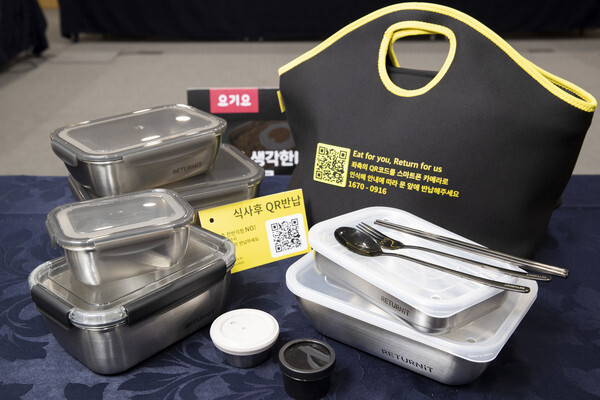
JEJU – Jeju Island is taking a significant step towards sustainability with the official launch of its reusable container delivery service. Starting August 13, residents in the Yeon-dong and Nohyeong-dong districts of Jeju City can now opt for reusable containers when ordering food through popular delivery apps like Baedal Minjok and Meokgaebi. This initiative, starting with 88 participating restaurants, is part of a larger plan to reduce single-use plastic waste and achieve carbon neutrality across the island.
The service is a collaboration between the Jeju provincial government and local businesses. The government's goal is ambitious: to expand the program to all of Jeju City's urban areas by 2026 and eventually cover the entire island by 2027. This phased approach allows for a careful rollout, ensuring the necessary infrastructure is in place and businesses and consumers can adapt smoothly.
How the Program Works
Using the service is simple and convenient for consumers. When placing an order on Baedal Minjok or Meokgaebi, customers can select the "reusable container order" option in the special requests section. After their meal, they simply scan a QR code on the dedicated delivery bag to request a pickup. A specialized company then collects the used containers, handles the cleaning and sanitization process, and prepares them for reuse. This entire process is seamless, requiring no extra effort from the consumer beyond scanning the code.
To encourage participation, the Jeju government is offering a generous incentive program. For every order made with a reusable container, consumers receive 2,000 KRW in local Tamna Jeon currency. Furthermore, the delivery apps themselves are offering additional benefits. Baedal Minjok, for example, is providing a 5,000 KRW discount coupon for the first week of the service and is also running an open event for 10 days, issuing 150 daily coupons worth 10,000 KRW each. Meokgaebi is offering a 5,000-point payback for each reusable container order, which can be used for future purchases.
Expanding the Initiative and Incentivizing Businesses
The program isn't just about consumer incentives; it also provides significant benefits for participating restaurants. The government is offering restaurants a 10,000 KRW incentive for their first reusable container order and 1,000 KRW for each subsequent order. To ease the transition for businesses, the rental cost of the containers is also currently free during this pilot phase.
This support is crucial for small business owners who may be hesitant to adopt new practices. By absorbing the initial costs and providing financial incentives, the government is lowering the barrier to entry and encouraging widespread adoption. The success of this program hinges on the active participation of both consumers and businesses, and the robust incentive structure is designed to foster this collaboration.
The introduction of the reusable container service comes at a time when environmental consciousness is at an all-time high. A study by the Ministry of Environment in 2023 showed that South Korea's per capita plastic consumption is among the highest in the world. The surge in food delivery services, particularly since the COVID-19 pandemic, has exacerbated the problem, leading to a dramatic increase in single-use plastic waste. The Jeju initiative is a direct response to this growing challenge, offering a tangible solution that benefits the environment and the local economy.
Kang Ae-suk, Director of the Climate and Environment Bureau of Jeju Province, expressed optimism about the program's future. "We plan to secure national funding and expand our infrastructure with the goal of extending this service across the entire island by 2027," she stated. "We hope that consumers' commitment to environmental protection and business owners' active participation will lead to the recovery and growth of small businesses, as well as the protection of our precious environment."
The Jeju reusable container service represents a forward-thinking approach to tackling a global problem. It combines environmental responsibility with economic incentives, creating a sustainable model that could serve as a blueprint for other regions. By making eco-friendly choices easy and rewarding, Jeju Island is paving the way for a greener, more sustainable future.
[Copyright (c) Global Economic Times. All Rights Reserved.]




























